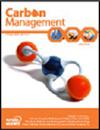Carbon stock recovery from tree regeneration following selective logging in tropical forest of the Yucatan Peninsula, Mexico
IF 3.2
4区 环境科学与生态学
Q3 ENVIRONMENTAL SCIENCES
引用次数: 0
Abstract
Abstract Selective logging in the tropics results in carbon emissions but also creates favourable environmental conditions for the regeneration of tree species and carbon recovery. We evaluate tree regeneration and recovery of biomass in selectively logged forests impacted by timber harvesting on the Yucatán Peninsula, Mexico. Fieldwork was conducted in two annual cutting areas logged in 2001 and 2009. Plots were established in felling, skidding and log landing sites. Regeneration of functional tree groups characterized by their growth, light demand, timber use, and recovery rates of biomass and carbon were assessed. Regeneration of 68 tree species in 54 genera and 27 families were found. Of these, 50% corresponded to marketable timber species. There was a greater presence of light-demanding seedlings and species in both annual cutting areas. Carbon recovery five and thirteen years after logging was 50.6 Mg ha−1 and 62.7 Mg ha−1, respectively, reflecting an annual gain of 1.51 Mg ha−1. Felling sites presented the highest diversity and carbon recovery and contained the highest quantity of trees >5 cm DBH and proportion of shade-tolerant species, providing a variety of future crop trees. Low logging intensity and practices that reduce impacts can result in the successful recovery of timber species and forest carbon. Key policy highlights Community managed forests recover carbon rapidly after low intensity selective logging and serve as carbon reserves. Low intensity selective logging with reduced impact logging practices minimizes harvest disturbance and allows for natural regeneration of timber species. Carbon recovery and capture after selective logging under low intensities provides economic and social opportunities through carbon offset projects.墨西哥尤卡坦半岛热带森林选择性采伐后树木再生的碳储量恢复
本文章由计算机程序翻译,如有差异,请以英文原文为准。
求助全文
约1分钟内获得全文
求助全文
来源期刊

Carbon Management
ENVIRONMENTAL SCIENCES-
CiteScore
5.80
自引率
3.20%
发文量
35
期刊介绍:
Carbon Management is a scholarly peer-reviewed forum for insights from the diverse array of disciplines that enhance our understanding of carbon dioxide and other GHG interactions – from biology, ecology, chemistry and engineering to law, policy, economics and sociology.
The core aim of Carbon Management is it to examine the options and mechanisms for mitigating the causes and impacts of climate change, which includes mechanisms for reducing emissions and enhancing the removal of GHGs from the atmosphere, as well as metrics used to measure performance of options and mechanisms resulting from international treaties, domestic policies, local regulations, environmental markets, technologies, industrial efforts and consumer choices.
One key aim of the journal is to catalyse intellectual debate in an inclusive and scientific manner on the practical work of policy implementation related to the long-term effort of managing our global GHG emissions and impacts. Decisions made in the near future will have profound impacts on the global climate and biosphere. Carbon Management delivers research findings in an accessible format to inform decisions in the fields of research, education, management and environmental policy.
 求助内容:
求助内容: 应助结果提醒方式:
应助结果提醒方式:


